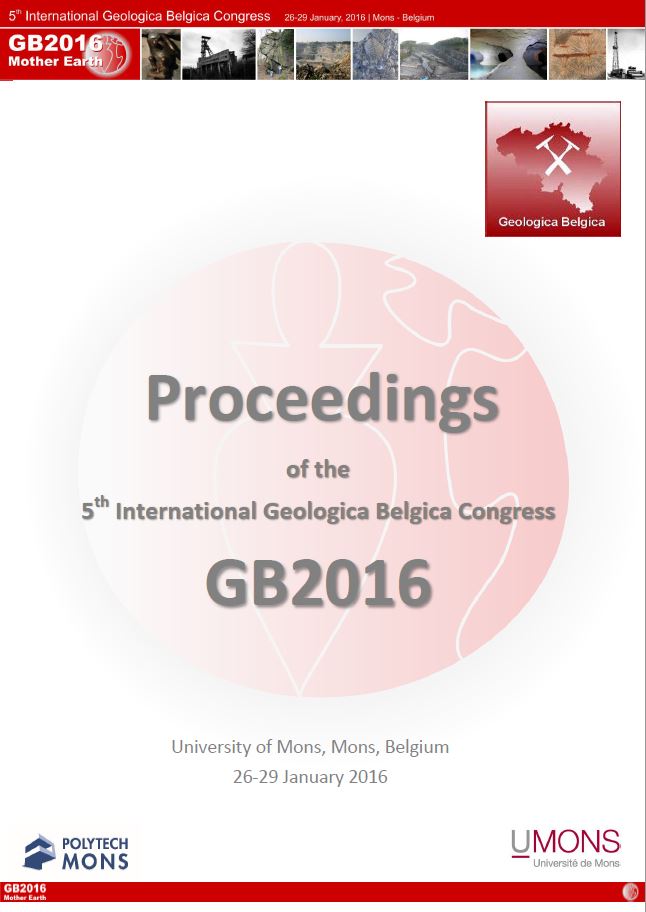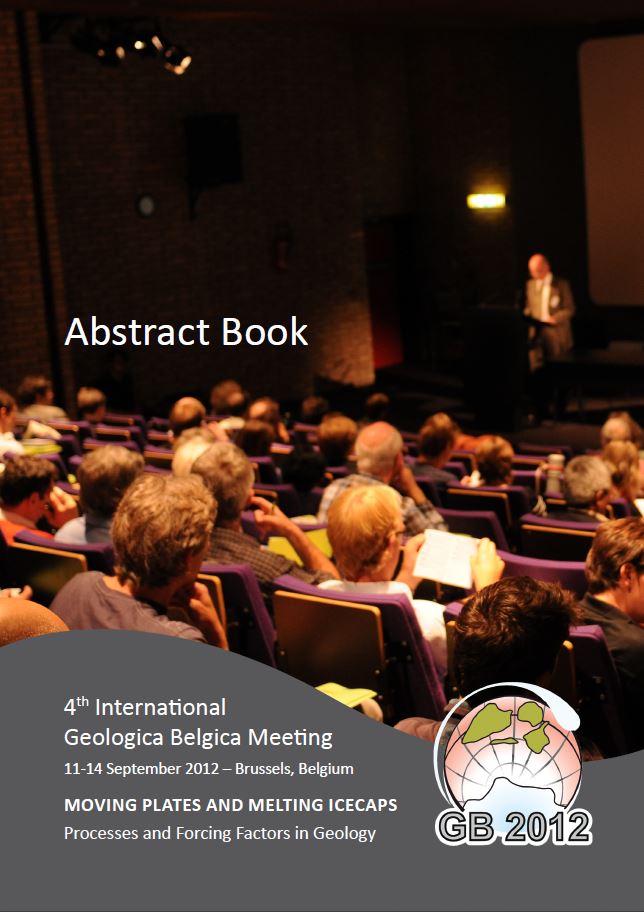Meetings
- Home
- Activities
- Meetings
Geologica Belgica is organising an International meeting every three years in Belgium. This meeting is a possibility for the belgian scientific community to present the latest studies and discoveries. The scientific colleagues from the neighbouring countries are also participating to meet again colleagues and friends.
Hereafter, the previous Geologica Belgica Meetings:
- NEW | 8th International Meeting in University of Liège - 2024
- 7th International Meeting in Tervuren - 2021
- 6th International Meeting in Leuven - 2018
- 5th International Meeting in Mons - 2016
- 4th International Meeting in Brussels - 2012
- 3rd International Meeting in Ghent - 2009
- 2nd International Meeting in Liège - 2006
- 1st International Meeting in Leuven - 2002
8th International Meeting in Liège - 2024
The Organizing and the Scientific Committees are pleased to announce that the 8th International Geologica Belgica Meeting 2024 will be held at the University of Liège, in the center of the city: Campus du Centre-ville - Zone Outremeuse, Belgium) on the 11-13 September 2024, at the same time Celebrating the 150th Anniversary of the “Société Géologique de Belgique”.
If you’re interested to participate/register -> please consult the website for more details: [International Geologica Belgica Meeting 2024 website]
7th International Meeting in Tervuren - 2021
The Organizing and the Scientific Committees are pleased to announce that the 7th International Geologica Belgica Meeting 2021 will be held in the Africa Museum in Tervuren (at the southern outskirt of Brussels, Belgium) on the 15-17 September 2021, with as general topic: Geology Made in Belgium.
If you’re interested to participate/register -> please consult the website for more details: [geologicabelgica2021 website]
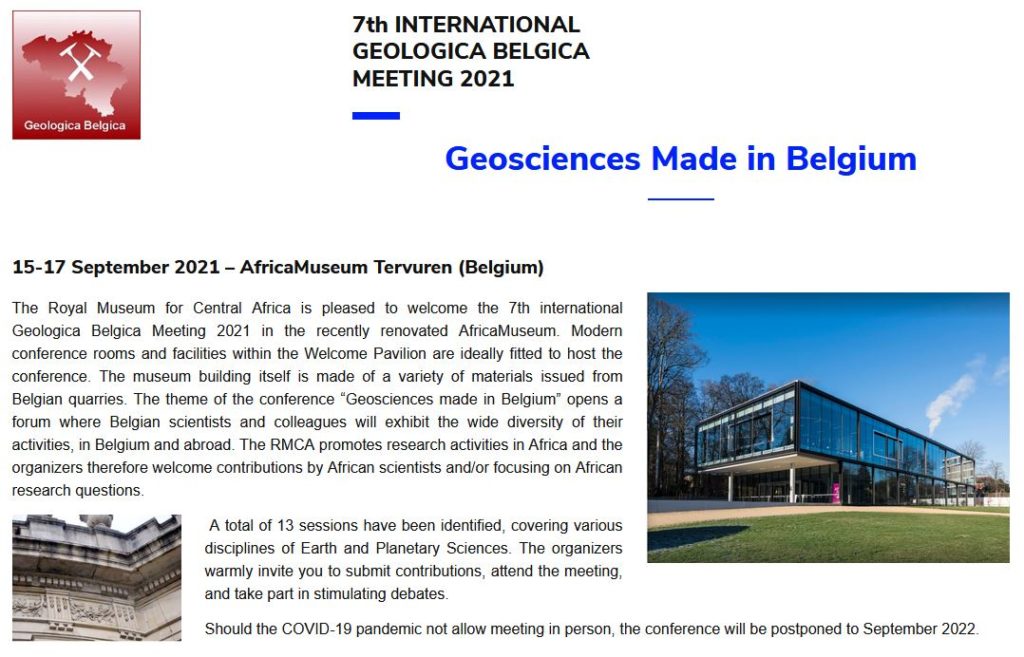
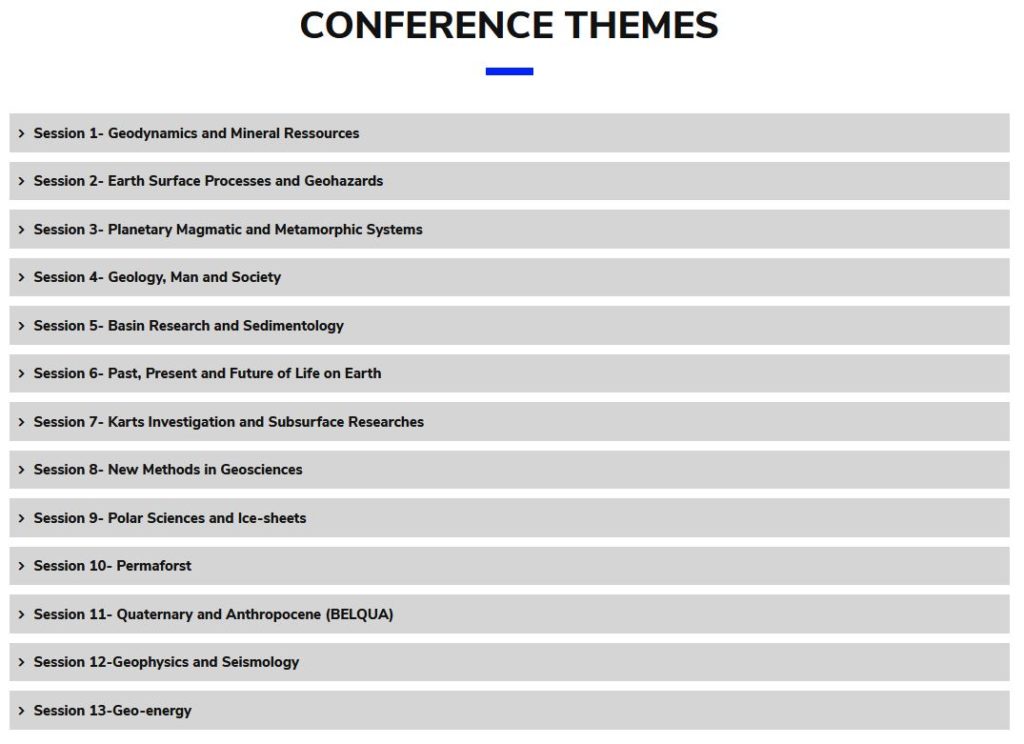
6th International Meeting in Leuven - 2018
0rganization of the Congress
The ‘6th Geologica Belgica 2016’ congress was held at the University of Leuven, from the 12th to the 14th of September 2018. This congress is organized under the supervision of the non-profit scientific association ‘Geologica Belgica’. It aimed to gather Belgian and international researchers active in Earth Science disciplines in Belgium. This 6th Geologica Belgica international congress was organized under the general theme "Geology serving society". Nevertheless, a wide range of Earth Science disciplines has been covered during the congress, including, but not restricted to paleoclimatology, geo-energy & reservoirs, hydrogeology, geomaterials and ore geology, geoenvironment, geohazards, deep geological processes, stratigraphy and sedimentary geology, early and past life, plate tectonics and structural geology, geoheritage, geoeducation and geoarcheology. Language of the congress is English.
The event was a real success. During the 3 days of the congress, 86 scientific talks and 74 posters were presented by national and international researchers, 156 participants have registered for the congress.
Finally, the General Assembly of the Geologica Belgica members was also organized at the occasion of the congress. The best student poster of the congress was also awarded.
The scientific committee of the congress was composed by:
• Jean-Marc Baele (Université de Mons, Belgium)
• David Lagrou (Vlaamse Instelling voor Technologisch Onderzoek, Belgium)
• Thierry Camelbeeck (Observatoire Royal de Belgique, Belgium)
• Philippe Claeys (Université Libre de Bruxelles, Belgium)
• Marc De Batist (Universiteit Gent, Belgium)
• Mieke De Craen (Studiecentrum Mol, Belgium)
• Sophie Decrée (Royal Belgian Institute of Natural Sciences, Belgium)
• Jan Elsen (Katholieke Universiteit Leuven, Belgium)
• Jacqueline Vander Auwera (Université de Liège, Belgium)
• Johan Yans (Université de Namur, Belgium)
The organizing committee of the congress was composed by:
• Rudy Swennen Professor KULeuven
• Gert Jan Weltje Professor KULeuven
• Robert Speijer Professor KULeuven
• Philippe Muchez Professor KULeuven
• Jan Elsen Professor KULeuven
• Rieko Adriaens Post-doc KULeuven
• Hannes Claes Post-doc KULeuven
• Niels Hulsbosch Post-doc KULeuven
• Peter Stassen Post-doc KULeuven
• Jeroen Soete Post-doc KULeuven
The complete scientific program and abstract book is provided on the website of the congress: https://ees.kuleuven.be/gb2018/
GEOLOGICA BELGICA MEETING 2018 PROGRAMME
Each Session of the GB Meeting was devoted to one of the seven following themes.
Theme 1. Visualizing and monitoring the earth: natural and anthropogenic processes
During the last decade, improvement and miniaturization of geophysical instruments and techniques together with improved computer facilities helped analyzing huge amount of data, allowing for 3-D to 4-D visualization and monitoring of processes at the Earth's surface.
We propose to convene a session on: "Geophysical and geodetic monitoring of natural and man-induced processes". The session welcome contributions devoted to the use of geophysical and geodetic methods to image and monitor natural or man-induced processes like those involving earthquakes, volcanoes, geothermal or hydrological systems, landslides or rock mass movements, etc.
Theme 2. Understanding planets through magmatic differentiation
Magmatic differentiation processes, such as crystal fractionation, mixing, assimilation or immiscibility modify the composition of primary magmas that were produced by partial melting of their source. These processes produce distinctive geochemical signatures characterized by marked elemental enrichments and/or depletions as well as specific isotopic compositions. As such, parts of the crustal rocks are among the most fractionated on Earth.
The session will combine case studies of magmatic differentiation observed during the full evolutionary range starting from the formation of the solar system and meteorites, the partial melting of the upper mantle and lower crust, up to the formation of upper crustal melts. Particular attention will be given to the identification of mechanisms responsible for the elemental and isotopic signatures of melts and for the establishment of distinct chemical reservoirs in planetary systems, to results from experimental petrology, and to mechanisms involving fluids.
Theme 3. New developments in geology and their role in future research
New developments in analytical techniques and experimental research, new insights in mathematical and computer models and new sampling and imaging techniques had and will continue to have a major impact of our understanding of geological processes. In this theme these new developments and their possible role in different fields of geology and closely related fields such as archaeometry and physical geography are presented.
Theme 4. Geo-resources, -materials and –energy in a circular economy
The steady increase in the world’s population urges us to produce more and more geological resources that serve as the basis for life in our modern-day, sustainable society. There is not only a growing demand for rare or exotic elements, used in high-tech applications, but also for resources, which were thus far considered as common (e.g., Mg-minerals, fluorite, etc.). The supply of many of these materials may become problematic in the near future, which stimulates both geological exploration and mining industry, even in EU countries. This theme of the conference is aimed at promoting discussion of strategies to address challenges in innovating and developing geo-energy and geo-resources extraction, and greenhouse mitigation measures. Chain strategies and innovative technologies are key aspects of a sustainable economy. Supporting the cradle to cradle loop scientifically is imperative to lower our environmental footprint and to sustain utility and material reserves for society. Building a better future starts with being front runners in recycling and with actively expanding our circular economy.
Theme 5. Hydrology and environmental geology for the future
Studies on hydrogeology and environmental geology serve society in multiple ways, contributing to sustainable management and use of both soil and groundwater. Contributions about soil and shallow groundwater as well as studies on deep groundwater are thus warmly invited for this session. In addition, field studies, characterization techniques, advances in numerical modeling and management studies are of high interest.
The following main topics will be addressed:
• Groundwater and soil in a changing environment: consequences of land use and climate change, sustainable use and management of soil and groundwater
• Soil and groundwater pollution and environmental geochemistry
• Shallow and deep geothermal applications and its relation to groundwater
• Advances in characterization and modeling methods in hydrogeology and environmental geology
• Groundwater in complex settings: heterogeneous aquifers, such as karstified and fissured reservoirs, transboundary aquifers a.o.
Theme 6. Biotic and climatic evolution and paleoenvironments through time
Environmental and climate changes are a pervasive part of Earth’s history and illustrate how the biosphere and geosphere operate on geological time scales. Earth’s surface processes are thus not static entities as these react dynamically to biotic and abiotic forcing related to e.g. major devastating events, geo-hazards, evolutionary innovations and adaptations to paleoceanographic or climate changes. Documenting these dynamics in a multidisciplinary approach is essential to understand the evolution of natural processes during various climate states and time scales. This session is open for all contributions involving the integration of biotic, geochemical and lithological data through time and space, which can also provide insight into possible future trajectories during the present millennium.
Theme 7. Lessons to be learned from geoarchaeology
The field of geoarchaeology focuses on the development and application of exact scientific techniques on a wide range of archaeological questions and materials. Providing analytical data for archaeology is an application oriented field for geoscientists which enhances our understanding of the dynamic interactions between environmental changes and the evolution of human cultures and economies. The session aims to present the full spectrum of geological activities in the field including, but not limited to, material characterisation, provenance studies, reconstruction of production technologies, archaeochronometry, geophysical prospection, remote sensing, earthquake archaeology, human-environment interactions, paleoenvironment, and palaeoclimate studies.
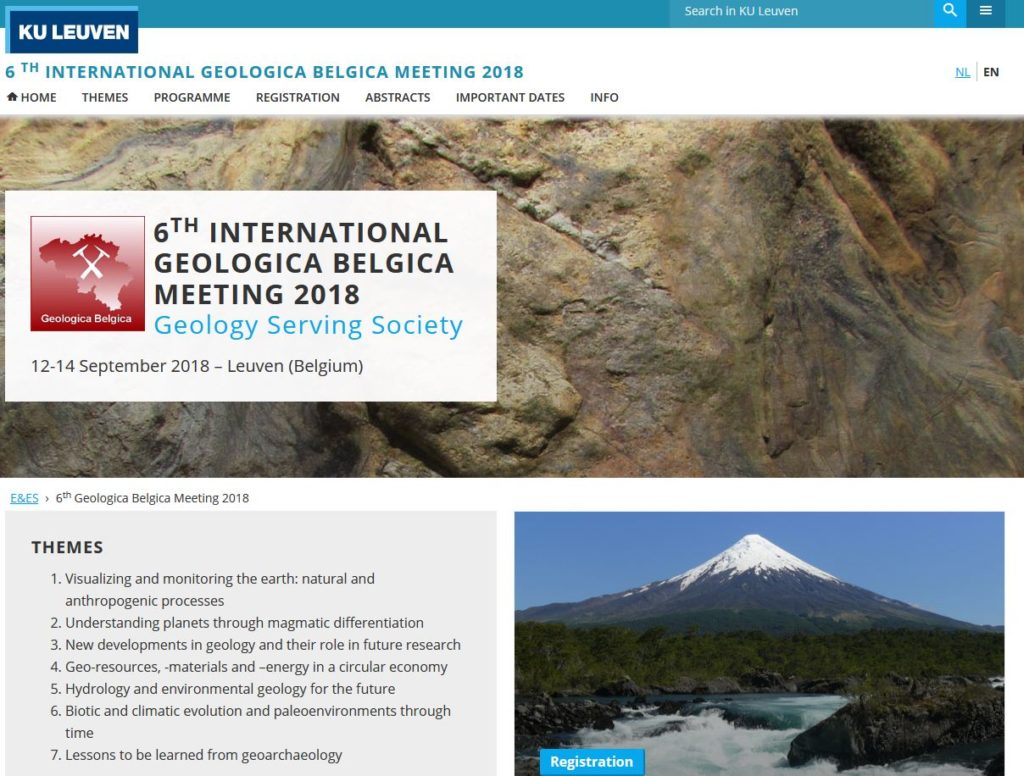
Please consult the website for more details: GB2018 website
5th International Meeting in Mons - 2016

Ladies and Gentlemen, Dear Colleagues, Monsieur le Doyen,
On behalf of the scientific association Geologica Belgica, I have the honour to open the 5th International Geologica Belgica meeting in Mons. This beautiful university city is the fifth in row to organise the Geologica Belgica Congress, after Leuven in 2002, Liège in 2006, Gent in 2009 and Brussels in 2012.
The Geologica Belgica Congress, is the largest gathering of earth scientists in Belgium, uniting all geoscience research centers from the north and south of the country and open to our neighbours, for some days of intensive exchange. These congresses and a journal with impact factor, equally named Geologica Belgica, form the flagships of our scientific association.
Geologica Belgica is a rather young organisation, founded in 1999 as a result from the merger of two older geological societies whose history goes back 140 years. The purpose of this merger was to abandon the divisions of the past and to unite forces to represent geoscience at the national level. This is no easy task, which can only be realised through the continued and benevolent support of its members. I thank all of you in the audience who as members of our society make this happen. I ask those who are not yet members to consider joining as well.
The theme of the present meeting, Mother Earth, sounds more compassionate than the theme of the previous meeting in Brussels, Moving plates and melting icecaps, and also less utilitarian than the theme in Gent, Challenges for the Planet. Mother Earth makes clear that humanity is united in its relation to the Planet Earth and that we all depend on the proper functioning of the intricate ecosystems and material cycles that keep the Earth a living planet. Care for the present and concern for the future start with good understanding of where we stand now and where we are heading to, after 4 and a half billion years of Earth history. This understanding advances continuously and so must be the exchange between scientists.
We have gathered here to learn from each other and increase cooperation. This has been made possible through the preparatory work of the organising committee, who ensure that the congress runs smoothly. It all looks very promising and I look forward to a very rewarding meeting.
Michiel Dusar
President Geologica Belgica
For those interested, the Abstract book and conference programme were published by Geologica Belgica and can be cited:
-> "Jean-Marc BAELE, Séverine PAPIER, Xavier DEVLEESCHOUWER, Nicolas DUPONT, Pascal GODERNIAUX, Michel HENNEBERT & Olivier KAUFMANN, «5th International Geologica Belgica Congress: 26-29 January 2016 – Mons, Belgium», Geologica Belgica Conference Proceedings, Volume 2 (2016), 304 p. DOI: https://doi.org/10.20341/gbcp.vol2"
4th International Meeting in Brussels - 2012

Dear participants of GB2012,
It was a pleasure one year ago to organise the 4th International Geologica Belgica conference, and it is with the same pleasure that we now present the official proceedings of this conference. We hope this may be a lasting memory to, as well as the scientific valorisation of your work presented at this international event.
Some of the abstracts in these proceedings are only the teasers for the several full papers that appeared in the Geologica Belgica journal during the past year. We know that several other papers are still under review or under preparation, but for those that have been published, we have added a reference next to the abstracts. However, make certain to keep an eye open for follow-up papers of abstracts and authors that attracted your attention during GB2012, as well as consult the recently appeared volumes, which include the special volume 16(4) – “Dispersal of continental vertebrates during the Paleogene”.
Let the record show that the 4th International Geologica Belgica conference attracted 241 participants from 26 different countries, who presented a total of 137 oral and 99 posters during three days, in up to three parallel sessions. The program was animated by a field trip in Brussels, a visit to the museum and its collections, and the unique occasion to enjoy the conference dinner in the main dinosaur gallery of the museum.
As usual, special attention went out to the young researchers with a competition for best oral and best poster presentation. The abstracts of the top three laureates are highlighted in this volume. If you want to refresh your memory, we invite you to pages 121, 122, 139, 146, 236 and 261 to read about the work of these upcoming talents.
Trond Torsvik was awarded the André Dumont Medal 2012 for his outstanding career. His publication entitled “From Wegener until now: the development of our understanding of Earth’s Phanerozoic evolution”, which most perfectly addressed the conference theme, appeared in volume 15(3) of Geologica Belgica that each participant received as part of the welcome package.
A special thank you to all who chose to participate to GB2012, and especially to the five key-note speakers, the chairs of the sessions, the scientific committee, the enthusiastic team of young geologists and palaeontologists, the event personnel of the RBINS, and of course our sponsors.
Looking forward to meeting all of you again,
Kris - Stephen - Thierry - Vanessa - Xavier
For those interested, the Abstract book and conference programme were published by Geologica Belgica and can be cited:
-> "Xavier DEVLEESCHOUWER, Vanessa M.A. HEYVAERT, Stephen LOUWYE, Kris PIESSENS & Thierry SMITH, «4th International Geologica Belgica Meeting: 11-14 September 2012 – Brussels, Belgium», Geologica Belgica Conference Proceedings, Volume 1 (2012), 280 p. DOI: https://doi.org/10.20341/gbcp.vol2"
-> Resulting from the meeting, 13 papers from the session "Dispersal of land vertebrates during the Paleogene" were collected and published as a special volume by Geologica Belgica and can be found here:
Volume 16 (2013) number 4 - Dispersal of continental vertebrates during the Paleogene -> content 16/4 - 2013
3th International Meeting in Ghent - 2009
2nd International Meeting in Liège - 2006
The Congress, held on 7-8 September at the Maison de la Métallurgie in Liège, was very successful, more than 100 attendants were registered. The scientific content was covering a wide range of disciplines and the 81 oral presentations and posters were of high quality.
In view of these achievements, it has thus been decided that it was worthwhile keeping a printed record of this scientific event. The first fascicule of volume 10 (2007) of the Belgian journal GEOLOGICA BELGICA will contain the Proceedings of the 2nd Belgian Geological Congress. All the abstracts will be printed free of charge.
1st International Meeting in Leuven - 2002

